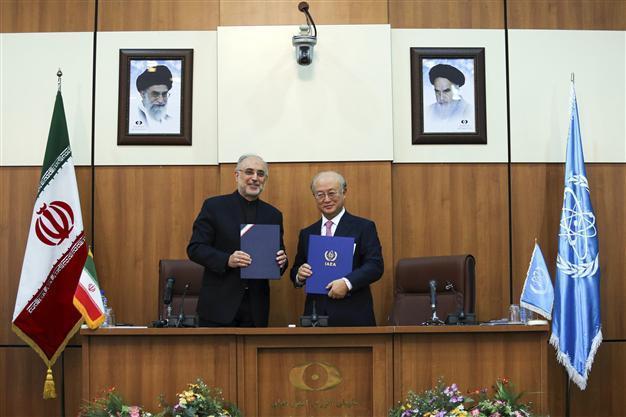Israeli sources claim Iran nuclear drive costs $170 billion
JERUSALEM - Agence France-Presse

Head of Iran's Atomic Energy Organization Ali Akbar Salehi, left, and International Atomic Energy Agency (IAEA) Director General Yukiya Amano, pose for a photo under portraits of Iran's supreme leader, Ayatollah Ali Khamenei, left, and Iran's founder of Islamic Republic, Ayatollah Ruhollah Khomeini, right, following their meeting in Tehran, Iran, Monday, Nov. 11, 2013. AP photo
Israeli security sources claimed Tuesday that Iran's disputed nuclear programme has cost the country $170 billion, mostly due to tough economic sanctions.
The estimate came as Israel and the US were locked in a war of words over negotiations between world powers and Iran that could see sanctions relaxed in exchange for Tehran curbing or freezing parts of the nuclear programme.
Of the $170 billion price tag, $40 billion was "invested over the past 20 years in the construction and operation of nuclear infrastructure," the sources told AFP.
They said Iran had "lost $130 billion because of sanctions put in place since 2012," including $105 million linked to the oil sector and $25 billion to banking, trade and industry, development and investment.
US ambassador Dan Shapiro on Monday sought to quell Israeli fears over an emerging deal with Iran, vowing that Washington would never let Tehran acquire a nuclear weapon.
President Barack Obama "will not permit Iran to acquire a nuclear weapon, period," he told delegates attending the General Assembly of the Jewish Federations of North America in Jerusalem.
Western countries accuse Iran of seeking to develop an atomic weapon, a charge Tehran denies.
Diplomats have said they are closing in on an interim agreement that would freeze or curb some of Iran's nuclear activities for as long as six months in exchange for an easing of the tight sanctions on the Islamic republic, after failing to secure a deal at weekend crunch talks in Geneva.
Israel's Prime Minister Benjamin Netanyahu has furiously denounced the emerging agreement as "dangerous", reaching out to world leaders and to the American public to get his point across.
Officials in Israel have warned they could carry out unilateral military action to stop Iran developing nuclear weapons capability.
The Israeli sources also gave figures for the amount of money they said Iran had sent to its allies in Syria -- President Bashar al-Assad's regime in Damascus and Lebanese Shiite movement Hezbollah -- as well as to Gaza's Islamist rulers Hamas and the Gaza-based Palestinian Islamic Jihad.
Up to $10 billion dollars went to Hezbollah, "hundreds of millions" to Damascus, and $1.3 to $1.8 billion to Hamas and the PIJ, they said.
But they did not specify when and within what time frame this aid had been delivered.
